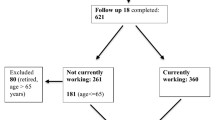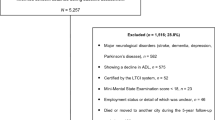Abstract
Objectives Since HIV has become a manageable chronic disease, employment is of increasing importance for people living with HIV (PLWH). This study aimed to investigate the level of work participation among PLWH in the Netherlands, and the associated determinants of employment. Methods For this study the baseline measurements of a longitudinal cohort study with a 2-year follow-up, the TREVI project, were used. The TREVI project aims to study cognitive function disorders among PLWH in relation to their employment, productivity, and social functioning. From December 2012 until December 2013, data on cognitive functioning, measured by the HIV Dementia Scale, and medical data derived from patient records were collected. Employment status and possible determinants of employment were assessed by a digital survey. Chi square analysis and multivariate logistic regression analysis were conducted in order to investigate the level of employment and associated determinants of employment. Results This cross-sectional study revealed significant differences in the level of employment compared with Dutch reference data: i.e. in the age group 40–54 years PLWH had a significantly lower employment rate than the general Dutch population. Multivariate analysis showed that employment was negatively associated with a lower or higher age (reference: 40–54 years), a longer period since diagnosis, problems with physical functioning, and a higher score on the HADS Depression. Having paid work at diagnosis was positively associated with employment. Conclusion PLWH, particularly in the age of 40–54, in the Netherlands have a significant lower level of employment compared to the general population. Counseling should address reduced psychological and physical functioning in order to improve the position of PLWH on the labor market.


Similar content being viewed by others
References
Degroote S, Vogelaers DP, Vermeir P, Mariman A, De Rick A, Van Der Gucht B, et al. Socio-economic, behavioural, (neuro)psychological and clinical determinants of HRQoL in people living with HIV in Belgium: a pilot study. J Int AIDS Soc. 2013;16(1):18643. doi:10.7448/IAS.16.1.18643.
Braveman B, Levin M, Kielhofner G, Finlayson M. HIV/AIDS and return to work: a literature review one-decade post-introduction of combination therapy (HAART). Work. 2006;27(3):295–303.
Rueda S, Raboud J, Mustard C, Bayoumi A, Lavis JN, Rourke SB. Employment status is associated with both physical and mental health quality of life in people living with HIV. AIDS Care. 2011;23(4):435–43. doi:10.1080/09540121.2010.507952.
Baanders AN, Rijken PM, Peters L. Labour participation of the chronically ill. A profile sketch. Eur J Public Health. 2002;12(2):124–30.
Detaille SI, Heerkens YF, Engels JA, van der Gulden JW, van Dijk FJ. Common prognostic factors of work disability among employees with a chronic somatic disease: a systematic review of cohort studies. Scand J Work Environ Health. 2009;35(4):261–81.
Brooks RA, Martin DJ, Ortiz DJ, Veniegas RC. Perceived barriers to employment among persons living with HIV/AIDS. AIDS Care. 2004;16(6):756–66. doi:10.1080/09540120412331269594.
Dray-Spira R, Gueguen A, Ravaud JF, Lert F. Socioeconomic differences in the impact of HIV infection on workforce participation in France in the era of highly active antiretroviral therapy. Am J Public Health. 2007;97(3):552–8. doi:10.2105/ajph.2005.081083.
Lem M, Moore D, Marion S, Bonner S, Chan K, O’Connell J, et al. Back to work: correlates of employment among persons receiving highly active antiretroviral therapy. AIDS Care. 2005;17(6):740–6. doi:10.1080/09540120412331336724.
Martin DJ, Steckart MJ, Arns PG. Returning to work with HIV/AIDS: a qualitative study. Work. 2006;27(3):209–19.
Vetter CJ, Donnelly JP. Living long-term with HIV/AIDS: exploring impact in psychosocial and vocational domains. Work. 2006;27(3):277–86.
Wagener MN, van Opstal SE, Miedema HS, Brandjes DP, Dahmen R, van Gorp EC, et al. Employment-related concerns of HIV-positive people in the Netherlands: input for a multidisciplinary guideline. J Occup Rehabil. 2014;24(4):790–7. doi:10.1007/s10926-014-9510-0.
Worthington C, O’Brien K, Zack E, McKee E, Oliver B. Enhancing labour force participation for people living with HIV: a multi-perspective summary of the research evidence. AIDS Behav. 2012;16(1):231–43. doi:10.1007/s10461-011-9986-y.
Van Gorp WG, Rabkin JG, Ferrando SJ, Mintz J, Ryan E, Borkowski T, et al. Neuropsychiatric predictors of return to work in HIV/AIDS. J Int Neuropsychol Soc. 2007;13(1):80–9.
Wagener MN, Roelofs PD, Miedema HS, Brandjes DP, Dahmen R, van Gorp EC. The development of a multidisciplinary, evidence-based guideline for “HIV and employment”. AIDS Care. 2015;27(2):133–41. doi:10.1080/09540121.2014.952612.
Sacktor NC, Wong M, Nakasujja N, Skolasky RL, Selnes OA, Musisi S, et al. The international HIV Dementia Scale: a new rapid screening test for HIV dementia. AIDS. 2005;19(13):1367–74.
Zigmond AS, Snaith RP. The hospital anxiety and depression scale. Acta Psychiatr Scand. 1983;67(6):361–70.
Wu AW, Revicki DA, Jacobson D, Malitz FE. Evidence for reliability, validity and usefulness of the Medical Outcomes Study HIV Health Survey (MOS-HIV). Qual Life Res. 1997;6(6):481–93.
Revicki DA, Sorensen S, Wu AW. Reliability and validity of physical and mental health summary scores from the Medical Outcomes Study HIV Health Survey. Med Care. 1998;36(2):126–37.
Berger BE, Ferrans CE, Lashley FR. Measuring stigma in people with HIV: psychometric assessment of the HIV stigma scale. Res Nurs Health. 2001;24(6):518–29.
Rappange DR, Brouwer WB, van Exel J. A long life in good health: subjective expectations regarding length and future health-related quality of life. Eur J Health Econ. 2015;17(5):577–89. doi:10.1007/s10198-015-0701-1.
Health Counsil of the Netherlands. Guidelines for a healthy diet. The Hague: Health Counsil of the Netherlands; 2006.
Kemper HCG, Ooijendijk WTM, Stiggelbout M. Consensus on the Dutch norm for healthy physical activity. Tijdschr Soc Gezondsheidsz. 2000;78:180–3.
Centraal Bureau voor de Statistiek. Statline. 2016. http://statline.cbs.nl/Statweb/publication/?DM=SLNL&PA=82309NED&D1=a&D2=a&D3=1-3,7-8&D4=0&D5=55-58,60-63,65-67&VW=T. Accessed 17 Mar 2016.
Stichting HIV Monitoring. 2012. http://www.hiv-monitoring.nl.
Dray-Spira R, Lert F, Bouhnik AD, Fagnani J, Heard I, Obadia Y et al. Living and working with HIV in France in 2003: results from the ANRS-EN12-VESPA study. AIDS. 2007;21(SUPPL. 1):S29–S36.
Klabbers G, Rooijackers B, Goertz Y, de Rijk A. Krachtig en kwetsbaar. Onderzoek naar de ervaringen met arbeidsparticipatie en sociale participatie van mensen met chronische ziekten en beperkingen. Maastricht: Maastricht University, The Netherlands, 2014.
Burns SM, Young LRL, Maniss S. Predictors of employment and disability among people living with HIV/AIDS. Rehabil Psychol. 2006;51(2):127–34.
DiClementi JD, Ross MK, Mallo C, Johnson SC. Predictors of successful return to work from HIV-related disability. J HIV/AIDS Soc Serv. 2004;3(3):89–96.
Dray-Spira R, Lert F, Marimoutou C, Bouhnik A, Obadia Y. Socio-economic conditions, health status and employment among persons living with HIV/AIDS in France in 2001. AIDS Care. 2003;15(6):739–748.
Ferrier SE, Lavis JN. With health comes work? People living with HIV/AIDS consider returning to work. AIDS Care. 2003;15(3):423–35.
Fogarty AS, Zablotska I, Rawstorne P, Prestage G, Kippax SC. Factors distiguishing employed from unemployed people in the positive health study. AIDS. 2007;21(SUPPL. 1):S37–S42.
Pitts M, Grierson J, Misson S. Growing older with HIV: a study of health, social and economic circumstances for people living with HIV in Australia over the age of 50 years. AIDS Patient Care STDS. 2005;19(7):460–5.
Rabkin JG, McElhiney M, Ferrando SJ, Van Gorp W, Lin SH. Predictors of employment of men with HIV/AIDS: a longitudinal study. Psychosom Med. 2004;66(1):72–8.
Barkey V, Watanabe E, Solomon P, Wilkins S. Barriers and facilitators to participation in work among Canadian women living with HIV/AIDS. Can J Occup Ther. 2009;76(4):269–75.
Dyer JL, Twillman N, Sequeira N. Determining the barriers to employment of HIV + clients. J Soc Work Disabil Rehabil. 2006;5(1):21–43.
Jong E, Oudhoff LA, Epskamp C, Wagener MN, Van Duijn M, Fischer S, et al. Predictors and treatment strategies of HIV-related fatigue in the combined antiretroviral therapy era. AIDS. 2010;24(10):1387–405.
Ezzy D, De Visser R, Bartos M. Poverty, disease progression and employment among people living with HIV/AIDS in Australia. AIDS Care. 1999;11(4):405–14.
Benedict RHB, Mezhir JJ, Walsh K, Hewitt RG. Impact of human immunodeficiency virus type-1-associated cognitive dysfunction on activities of daily living and quality of life. Arch Clin Neuropsychol. 2000;15(6):535–44.
Ferreira RCM, Figueiredo MADC. Replacement in the work market. Barriers and silence in the coping of the exclusion for people with HIV/AIDS. Medicina. 2006;39(4):591–600.
Maticka-Tyndale E, Adam BD, Cohen JJ. To work or not to work: combination therapies and HIV. Qual Health Res. 2002;12(10):1353–72.
McGinn F, Gahagan J, Gibson E. Back to work: vocational issues and strategies for Canadians living with HIV/AIDS. Work. 2005;25(2):163–71.
Timmons JC, Fesko SL. The impact, meaning, and challenges of work: perspectives of individuals with HIV/AIDS. Health Soc Work. 2004;29(2):137–44.
Acknowledgements
The authors thank all participants of the TREVI study, and the HIV nurses and HIV physicians of the Erasmus MC (Rotterdam, the Netherlands).
Funding
This study was supported with an educational grant from Janssen Pharmaceutical Companies.
Author information
Authors and Affiliations
Corresponding author
Ethics declarations
Conflict of interest
The authors declare that they have no conflict of interest.
Ethical Approval
All procedures performed in studies involving human participants were in accordance with the ethical standards of the institutional and/or national research committee and with the 1964 Helsinki declaration and its later amendments or comparable ethical standards.
Informed Consent
Informed consent was obtained from all individual participants included in the study.
Rights and permissions
About this article
Cite this article
Wagener, M.N., van den Dries, L., Van Exel, J. et al. Determinants of Employment in People Living with HIV in the Netherlands. J Occup Rehabil 28, 45–56 (2018). https://doi.org/10.1007/s10926-016-9692-8
Published:
Issue Date:
DOI: https://doi.org/10.1007/s10926-016-9692-8




